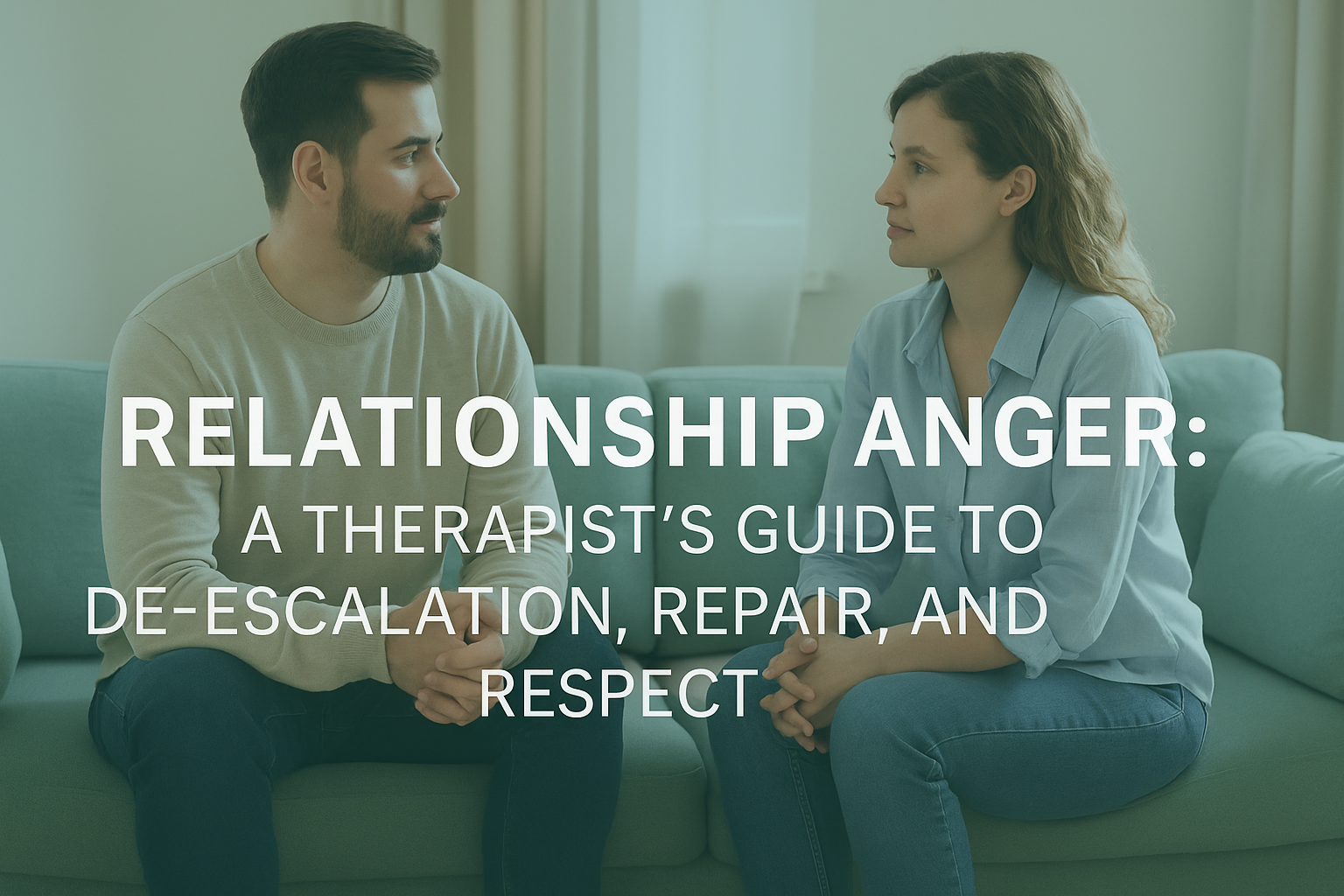When Love and Anger Collide
Every relationship experiences conflict. But when frustration turns to rage, conversations can quickly shift from connection to combat.
You might say things you don’t mean, withdraw to “cool off,” or find that small irritations spiral into larger emotional distance.
Anger in relationships is not proof that love is gone—it’s proof that something important isn’t being heard or understood.
Learning to de-escalate, repair, and rebuild respect after anger can transform not only your partnership, but your overall emotional resilience.
Why We Get Angry With the People We Love Most
Anger in relationships often isn’t about the present argument—it’s about unmet needs or old emotional wounds being re-triggered.
Common underlying causes include:
- Feeling unseen or dismissed. (“You never listen to me.”)
- Fear of abandonment or rejection. (“You always walk away when I need you.”)
- Power struggles. (“Why do I have to be the one who changes?”)
- Accumulated resentment. Small issues left unresolved over time.
- Stress spillover. Work or family pressures that find their outlet in the relationship.
Recognizing these patterns turns anger from a weapon into information. It reveals what your emotional system is trying to protect.
The Physiology of Conflict: Why We Say Things We Regret
During heated arguments, the body’s stress system activates. The heart rate rises, breathing quickens, and blood flow shifts away from reasoning areas of the brain toward survival centers.
When heart rate exceeds ~100 bpm, the rational brain essentially goes offline—a state psychologist John Gottman calls “emotional flooding.”
In this state, logic and empathy are inaccessible.
That’s why many couples later say, “I don’t know why I said that.” The goal is not to never feel angry—but to catch the escalation early and pause before the nervous system hijacks communication.
Five Therapist-Approved De-Escalation Strategies
1. Recognize Your Body’s “Anger Alarm”
Learn your personal signals of rising anger: clenched jaw, flushed face, rapid breathing, or tightening in the chest. Awareness gives you the power to intervene early.
2. Pause, Don’t Pursue
If either partner feels flooded, agree to take a 20–30-minute break. Step away, breathe, or go for a short walk.
Importantly, schedule a time to return to the discussion—otherwise the pause can feel like avoidance.
3. Use the “I Feel…When…” Formula
Replace blame (“You always ignore me!”) with clarity:
“I feel unimportant when I’m talking and you look at your phone.”
This structure communicates emotion and impact without accusation.
4. Lower Your Voice, Slow Your Breath
Anger fuels anger. When one partner lowers tone and pace, the other’s nervous system begins to mirror calm.
Physiological soothing is contagious.
5. Acknowledge and Repair Quickly
Even a short apology—“I overreacted; I was stressed”—restores emotional safety.
Repair attempts are the single best predictor of long-term relationship success, according to decades of research from the Gottman Institute.
Rebuilding Respect After Conflict
Respect isn’t about agreement—it’s about seeing your partner as human, even in moments of frustration.
Couples who repair effectively tend to:
- Listen to understand, not to win.
- Validate the emotion before debating the facts.
- Take ownership of tone, not just words.
- Practice gratitude daily, even in small ways.
Over time, consistent small repairs build a stronger bond than never fighting at all.
When Anger Turns Into Resentment or Withdrawal
Not all anger is loud. Some partners “freeze” or retreat instead of exploding.
This can be equally damaging—creating emotional distance that makes reconnection harder.
Signs you may need extra support:
- Frequent silent treatments or avoidance after arguments.
- Feeling afraid to express disagreement.
- Ongoing bitterness or emotional numbness.
- Arguments that repeat without resolution.
These patterns often reflect deeper emotional wounds that can be healed with professional guidance.
How Therapy and Hypnosis Help Regulate Relationship Anger
At Blossom Hypnosis, we help couples and individuals uncover the subconscious patterns that drive recurring anger—often rooted in fear, shame, or childhood conditioning.
Therapeutic hypnosis can:
- Reprogram reactive patterns stored in the subconscious.
- Strengthen empathy by visualizing conflict from the partner’s perspective.
- Reinforce calm, respectful communication habits.
- Build self-compassion to prevent guilt or rumination after conflict.
When combined with Cognitive-Behavioral Therapy (CBT) and Emotionally Focused Therapy (EFT) principles, hypnotherapy helps partners replace reactivity with mindful response—transforming anger into understanding.
When to Seek Professional Help
If conflicts regularly escalate, apologies feel ineffective, or resentment lingers for days, professional support can help reset communication patterns.
You don’t need to wait until the relationship feels broken—early intervention leads to faster healing.
At Blossom Hypnosis in Rochester, NY, we offer individualized hypnotherapy and counseling designed to help couples rebuild calm, trust, and connection.
Ready to transform conflict into connection?
Book a Free Consultation →
Frequently Asked Questions
Is anger always bad in relationships?
No. Anger is often a healthy signal that something needs attention. What matters is how it’s expressed and resolved.
What if one partner refuses therapy?
Individual hypnotherapy or counseling can still create powerful shifts in how you respond—often softening the overall dynamic.
How long does it take to improve communication?
Most couples notice progress within 4–8 sessions, depending on how long the negative patterns have been in place.


Be First to Comment